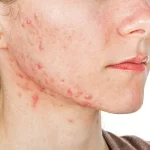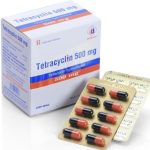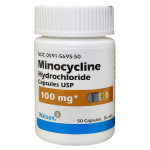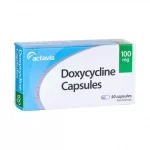If you have been dealing with acne with conservative treatments or over the counter acne products, and you have found no relief, a doctor might prescribe you antibiotics for acne. The use of Doxycycline for acne is often recommended to people who have moderate to severe acne related conditions who cannot find relief through conservative or at home treatments. Doxycycline has proven successful in treating some, but not all acne conditions. If you follow through with a course of prescribed antibiotics like Doxycycline and you do not experience relief, your doctor might recommend alternative antibiotics or acne remedies.
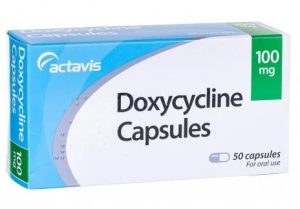
Does Doxycycline Work for Acne?
Doxycycline is actually a specific antibiotic that is part of a larger group of antibiotic medications identified as Tetracycline. The latter types of antibiotics are commonly offered to people with Rosacea, acne, or skin conditions that are caused by bacteria. Doxycycline for acne is usually offered to patients that have developed inflammatory acne conditions that have failed to respond to at home care or conservative treatment methods. This course of antibiotics is available via a prescription only and it is consumed orally, according to prescribed instructions. Alternative names for Doxycycline for acne include brand names like Vibramycin, Monodox, Doryx, and Adoxya.
Doxycycline for acne works on destroying, hindering, and stopping the spread of Propionibacterium acnes: a form of bacteria cited for inflamed, sore, red acne eruptions. You might be prescribed Doxycycline as a standalone medication, but some physicians like to offer the oral treatment along with a topical application for dealing with acne conditions. A topical solution commonly coupled with Doxycycline includes products containing Retin-A or Benzoyl Peroxide.
It has been found that Doxycycline for acne only works with certain kinds of acne: eruptions caused by bacterial infections. This antibiotic will not treat comedonal acne caused by the use or overuse of cosmetics, friction-induced acne caused by irritation to the skin, or whitehead formations or blackhead formations caused by clogged sebaceous glands. Doxycycline is an ideal treatment option for inflamed acne conditions.
Doxycycline Dosage For Acne
Usually, Doxycycline is prescribed as a dose that you will be required to take two times each day until the medication is gone. A common dosage offered to adults ranges from 50mg to 100mg two times each day.
When you are taking Doxycycline, you need to take the medication precisely as the instructions indicate. Usually, you should take your dosage with a glass of water and you will want to take the medication on an empty stomach. If you find that this antibiotic causes some stomach upset, then you can have a small bit of food before you take the medication. You should not drink dairy products when taking Doxycycline since this medication’s effectiveness can be hindered by dairy products. If you note that your acne diminishes or disappears and you still have antibiotics remaining, you have to finish the entire course of medication regardless of your improved conditions.
Side Effects
There are some minor side effects sometimes associated with the use of Doxycycline. You may experience an increased risk for developing a yeast infection: this is a common side effect associated with the use of most antibiotics since antibiotics destroy good as well as bad bacteria in the body. Good bacteria is the type that can thwart Candida overgrowth, but when taking antibiotics the good or healthy bacteria are destroyed too, so yeast infections can erupt, especially in females. Doxycycline has been known to cause stomach or intestinal upset and diarrhea too. Meanwhile, some people who have taken this product also develop issues with photosensitivity.
Pregnant females and nursing mothers cannot use Doxycycline for acne. This antibiotic has been found potentially damaging to the unborn fetus, and the medication can be passed to the nursing child during the breastfeeding process. This medication is not commonly offered to children since it can cause the discoloration of the teeth and it can also hinder growth in children.
Doxcycline can interact with some over the counter and prescribed medications. You need to talk to your medical professional or your pharmacist about potential interactions. This antibiotic can interfere with the effectiveness of warfarin, iron-containing vitamin supplements, phenytoin, alternative antibiotic medications, methoxyflurane, carbamazepine, bismuth subsalicylate, oral contraceptives, barbiturates, and antacids.
When compared to different acne treating antibiotics, Doxycycline, along with other forms of Tetracycline for Acne, is most ideal for inflamed acne conditions. If Doxycycline does not work for an individual, the person might be prescribed a medication like Minocycline: a common remedy for acne that fails to prove responsive to alternative antibiotic treatments. Doxycycline is delivered as an oral medication, while topical applications like Erythromycin and Clindamycin are supplied via a cream or ointment that is directly applied to the skin. The latter antibiotic creams/ointments may be offered in conjunction with Doxycycline for acne related conditions.
Doxycycline for Acne: Additional Considerations
Whenever you are prescribed an antibiotic that can cause photosensitivity, you will want to minimize the amount of time you spend out in the sun. If you do have to spend time in the sun or outdoors, you should wear a sunscreen to keep your skin protected. Even if it is cloudy out you will want to make use of a sunscreen that is at least 15 SPF.
Whenever you take any kind of antibiotic you should pay attention to your bodily responses. If you note the signs of an allergic reaction you will need to stop taking the medication and get in touch with your medical provider immediately. The symptoms commonly associated with an allergic response to Doxycycline include the onset of rash like conditions, chest pain, a darkening of urine color, the swelling of one’s tongue, lips, face, or mouth, blood in the stools, a decrease in urination, a sore throat, or the onset of chills and/or a fever.
You do not want to use Doxycycline for acne too often. Over use of antibiotic can cause your immune system to weaken. It can also cause you to be more susceptible to bacteria that prove antibiotic resistant. This medication is commonly offered for a short term period, roughly two to three weeks. If no improvement is noticed, another medication or alternative treatment options should be explored by you and your physician.

